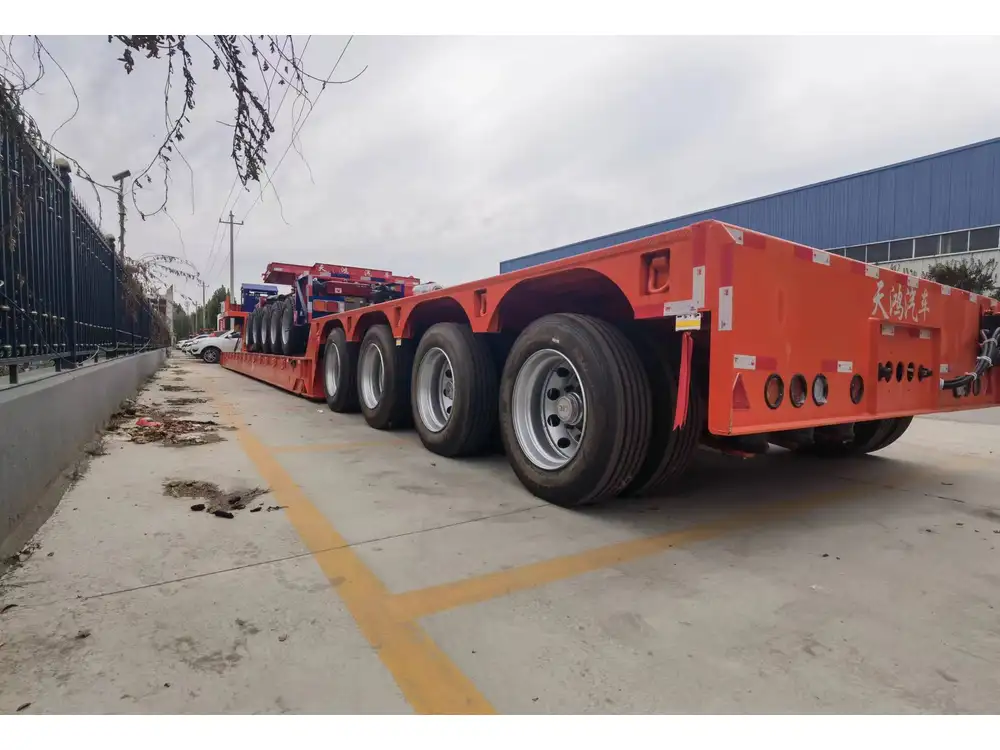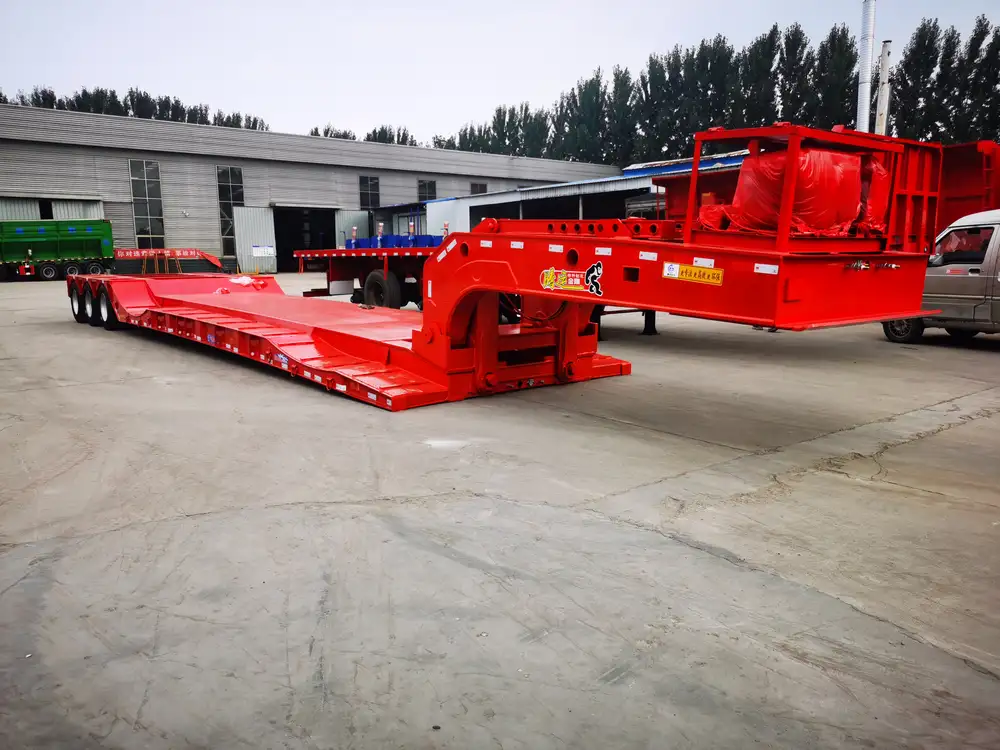When considering the logistics of transporting vehicles, understanding the weight of car trailers is crucial. In this article, we explore the intricate details surrounding car trailer weights, factors influencing those weights, types of trailers, and important considerations for buyers and users.
Understanding Car Trailer Weights
The Basics of Weight Measurement
Car trailers come in various sizes and designs, and their weight is measured in two primary components:
Empty Weight (Unloaded Weight): This is the weight of the trailer when it’s not carrying a vehicle. It includes the structural components of the trailer, such as the frame, axle, wheels, and other essential parts.
Gross Vehicle Weight Rating (GVWR): This refers to the maximum weight that a trailer can safely carry, which includes the weight of the trailer itself, a vehicle being towed, and any cargo or additional equipment.

Weight Distribution
Understanding weight distribution is essential for safe towing. Proper balance affects not only towing performance but also vehicle handling. A standard rule of thumb is to ensure that roughly 60% of the trailer weight is in front of the axle(s) and 40% behind. This balance prevents swaying and enhances stability on the road.
Factors Affecting Car Trailer Weight
Several variables contribute to the overall weight of a car trailer, including:
Material Composition
- Steel: Heavier but often more robust, steel trailers provide durability but increase the overall weight.
- Aluminum: Lightweight and resistant to rust, aluminum trailers offer ease of towing but can be less sturdy.
Size and Configuration
- Single Car Trailers: These typically range from 1,500 to 3,000 pounds empty weight.
- Multi-Car Trailers: Designed to carry two or more vehicles, these can weigh between 3,000 and 8,000 pounds when unloaded.
Design Features
- Brakes and Axles: Trailers equipped with additional brakes or multiple axles may add to the weight but enhance safety.
- Ramps and Loading Systems: Integrated ramps or winches increase convenience but also add weight.
Additional Equipment
- Toolboxes and Storage Compartments: These features provide utility but contribute to the overall weight of the trailer.
Typical Weights of Common Car Trailer Types
Understanding the wide variety of available trailers helps buyers make informed choices. Here is a concise table outlining the typical weights associated with various car trailer types:
| Trailer Type | Empty Weight (lbs) | Gross Vehicle Weight Rating (GVWR) |
|---|---|---|
| Open Car Trailer | 1,500 – 3,000 | 3,500 – 5,000 |
| Enclosed Car Trailer | 2,000 – 4,500 | 5,000 – 7,000 |
| Car Hauler Trailer | 2,500 – 5,000 | 7,000 – 10,000 |
| Multi-Car Trailer | 4,000 – 8,000 | 10,000 – 12,000 |
| Tilt-Deck Trailer | 2,500 – 4,500 | 5,000 – 9,000 |

Determining the Right Trailer Weight for Your Needs
Assessing Vehicle Compatibility
When selecting a trailer, evaluating the weight of the vehicle you plan to tow is essential. Consult your vehicle’s owner’s manual for its towing capacity. This figure determines if the trailer choice is feasible and safe for your specific towing vehicle.
Calculating Total Weight
Ensure to factor in both the trailer weight and the vehicle weight to ascertain the total weight you will be towing. For instance, if you have a trailer that weighs 3,000 pounds and a vehicle that weighs 4,000 pounds, your total towing weight would be 7,000 pounds. Always compare this total against your vehicle’s towing capacity.

Towing Regulations and Considerations
Local Legislation
Each jurisdiction may have specific regulations regarding trailer weights. These regulations can dictate:
- Maximum allowable trailer weight.
- Licensing and registration requirements.
- Specific towing equipment (such as weight distribution hitches).
Before making a purchase, it’s advisable to check local laws to ensure compliance.
Safety Considerations
Towing Equipment: Invest in high-quality hitches and safety chains that meet or exceed recommended standards for your trailer and towing vehicle.
Braking System: Ensure that the trailer is equipped with a proper braking system if it exceeds a certain weight. This can be a hydraulic or electric brake system for larger trailers.
Weight Distribution Hitches (WDH): Use these for better stability and easier handling, especially when towing heavier loads.
Tire Pressure: Regularly inspect tire pressure on both the towing vehicle and the trailer, ensuring they align with manufacturer recommendations.
Pre-Trip Inspection: It’s crucial to perform a thorough inspection before embarking on a journey. Check the lights, brakes, connections, and tires to prevent accidents.

Common Questions Regarding Car Trailer Weights
What is the heaviest car trailer available for civilian use?
Heavy-duty car trailers can range from 7,000 to 12,000 pounds in empty weight, specifically designed for multi-car hauling or specialized vehicles, such as recreational vehicles (RVs) or larger trucks.
How can I reduce the weight of my car trailer for towing?
To minimize the weight:
- Consider using lightweight materials, such as aluminum.
- Eliminate unnecessary features, such as additional storage compartments.
- Choose a minimalistic design that suits your needs without excessive structural components.

What are the risks of exceeding the trailer’s weight limit?
Exceeding the GVWR can lead to several hazards, including:
- Overheating brakes due to excessive load.
- Strain on the towing vehicle, potentially leading to mechanical failures.
- Increased risk of swaying and loss of control while driving.
Maintaining Your Car Trailer for Optimal Performance
Regular maintenance is crucial for ensuring the longevity and safety of your car trailer:
Routine Inspections: Conduct periodic checks of critical components like brakes, tires, lights, and electrical systems.
Proper Lubrication: Ensure that all moving parts, including couplings and axles, are properly lubricated to prevent wear and tear.
Storage Considerations: When storing your trailer, keep it in a dry and shaded environment, if possible, to prevent rust and other materials’ degradation.
Conclusion
Understanding how heavy a car trailer is involves considering the intricate factors that define its weight, including design, materials, and intended use. The process of selecting the right trailer not only hinges on knowing the weights involved but also requires careful consideration of regulatory compliance, safety, and maintenance. By empowering yourself with detailed knowledge and thorough preparation, you can make informed choices that enhance your towing experience while ensuring compliance with safety standards.
Whether you’re a casual user or a seasoned professional, comprehending these aspects will guide you toward making optimal, safe, and effective trailer decisions that align with your transportation needs.



